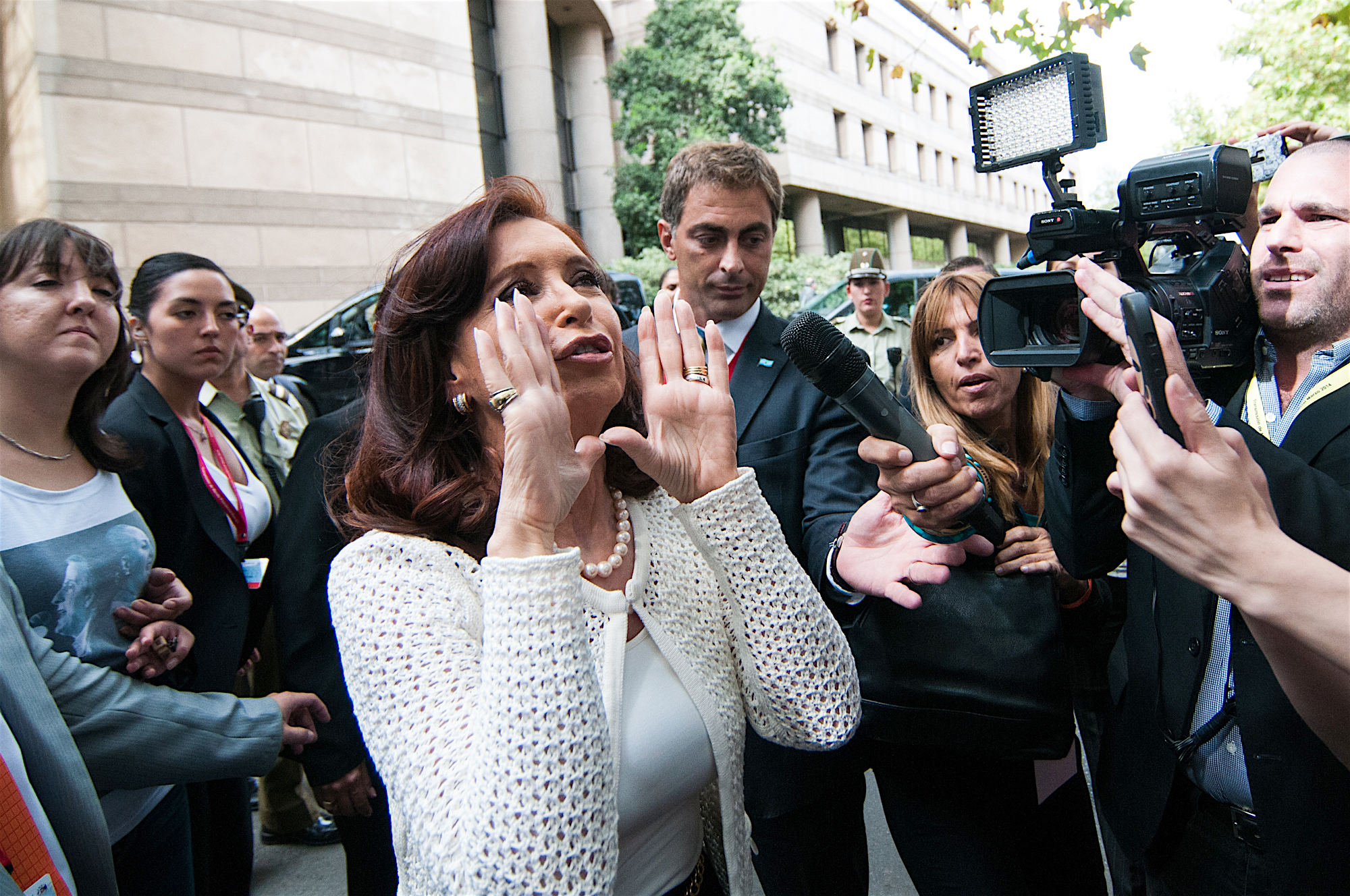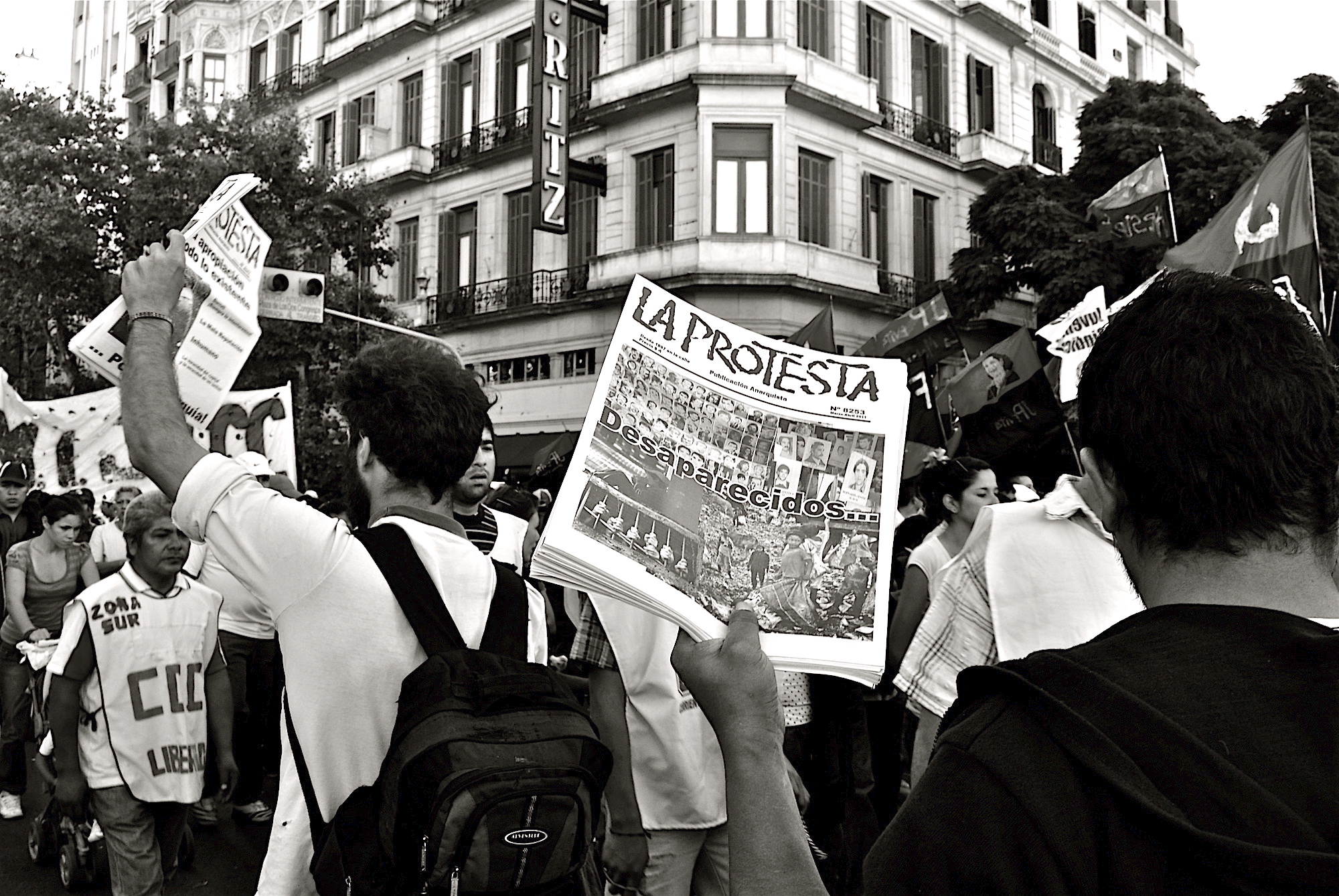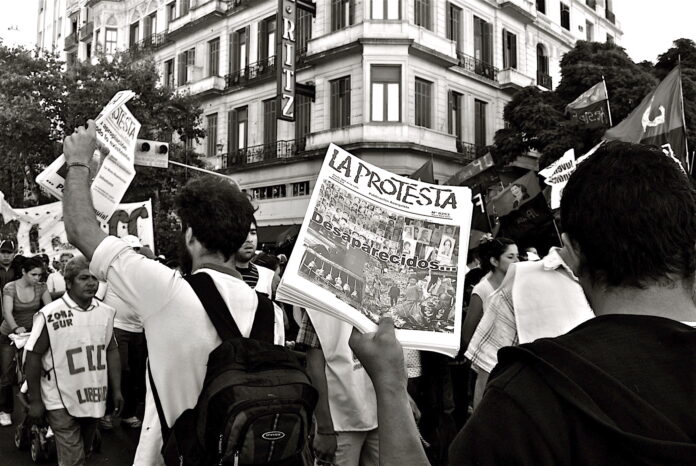The sun shines on this massive South American country, as people cheer on their soccer team, sip their early-morning mate and walk to their local store to pick up a new batch of empanadas and to gather ingredients for the asado of the day.
But however happy the people of Argentina may seem – jolly with their plethora of food and drink choices, range of beaches and city streets, and pride in their soccer team and its players – in the back of their minds, they know they are living in one of the most corrupt countries in the world.
According to a Business Anti-Corruption Portal maintained by the Danish compliance company GAN, Argentina presents a major challenge to foreign businesses that want to make inroads there, due to the high risk of corruption.
Transparency International, a global coalition committed to fighting corruption, estimates that corruption in Argentina has cost the economy more than $6.2 billion since 1990. Ranging from the judicial system to the police force to the tax administration, the country of tango and alfajores ranks 95th out of the 175 in Transparency International’s 2016 Corruption Perceptions Index, below Zambia, Morocco and China.
“The social and economic impact of corruption is huge, especially affecting the quality and efficiency of public services, such as education, health and transportation,” the organization stated. “In 2012, 52 people died in a train crash as a result of neglect and corruption.”
The government is linked with far worse things than neglect, though, given its long history of kidnapping children and mothers, and killing its citizens during the 1970’s Dirty War. It’s still working to repeal the laws from this time.
I set forth this background, because it’s clear that the situation for Argentine media is an outgrowth of the general corruption. It has even worsened in recent years.
The human rights research group Freedom House has declared Argentina “partly free” since before 2002. But with global press freedom on a steady decline since 2012, Argentine media has been held back by government corruption. As recently as January 2015, journalists were fleeing the country, scared that the government might kill them. That month, federal prosecutor Alberto Nisman accused then-President Cristina Fernandez de Kirchner of protecting Iranian officials suspected of complicity in the 1994 bombing of a Jewish community in Buenos Aires, in exchange for a grain-for-oil deal, according to Freedom House. The night before Nisman was supposed to present these findings to Argentine Congress, he was found dead of a gunshot wound in his home. The government performed an autopsy on the body, declaring the wound self-inflicted, although no gun residue was found on Nisman’s hands. The circumstances of his death are still unexplained. Damian Pachter, the journalist who broke the news of Nisman’s death, and did minimal investigation into the murder out of fear, fled to Israel, fearing for his safety. This is an example how corruption hampers Argentine journalism.

The Journalist’s Burden
Yet journalists have a duty to cover what goes on in their country. Argentina’s government interferes heavily in the media. According to Argentina’s Asociación por los Derechos Civiles, or Association for Civil Rights, and the Justice Initiative, the national government regularly abuses its advertising powers. Journalism is kept afloat through advertising, much of it government-generated — meaning that a newspaper’s financial position could be affected if advertising is withdrawn. This is one of the biggest problems in the country. “Official publicity,” or government advertising, is used as a form of “soft censorship,” the Committee to Protect Journalists (CPJ) argues, although it is not supposed to be used as a reward or punishment for coverage of the government. This practice of government advertising is also not closely regulated, which leads to its abuse. Government’s power to withhold advertising directly influences published content.
Argentina’s daily Pagina 12 usually publishes articles in line with the government’s views. In 2004 and 2005, research by the liberal-leaning Open Society Foundation concluded that there was “unjustified allocation to the advertising to…Pagina 12.” In 2006 and 2007, the government again gave Pagina 12 a “highly disproportionate share of government advertising that cannot be justified by the paper’s circulation or any other competitive advantages,” in the view of Open Society, a foundation supported by billionaire George Soros and a frequent champion of global media freedom initiatives. This information makes clear that the government is favoring newspapers that support its line.
The government also neglects newspapers that take an anti-government line. Open Society reported that in 2007, the newspaper Rio Negro was publishing harsh, critical coverage of the government, and said that the government subsequently withheld advertising in retaliation. Rio Negro took the issue to Argentina’s Supreme Court, which ruled that this was a form of indirect censorship. The court also ordered the government to “desist from allocating future advertising funds in a discriminatory fashion.” The government hasn’t necessarily complied, as Kirchner was suspected of continuing to favor pro-government media.
While cutting funds and advertising to newspapers has a clear impact on the media, this form of soft censorship is even worse. It puts journalists in a bad position, of not knowing what they should and should not publish, and possibly having their ethics questioned. The soft censorship in Argentina has gotten so bad that the government is sometimes physically controlling what the Argentine media publishes. Open Society found that top Argentine officials “routinely interfere with media content by pressuring media directors or editors and, at times, contacting journalists directly.”
The organization’s follow-up investigation revealed that these pressures are widespread in South America. In fact, the Argentine government went as far as “closing…a provincial newspaper’s printing press in retaliation for critical coverage of the local administration in 2007,” Open Society reported. By pressuring journalists and media owners to change their content, the corrupt government is directly influencing what Argentines consume. The effect of soft censorship on Argentine media is clear, as is the heavy influence of the government. Researchers at the Harvard-based journalism think tank Nieman Lab found within Argentina’s four largest newspapers a “huge correlation” between their “willingness to cover government scandal, and the amount of money they received from government coffers.” Its 2009 study concluded with a simple conclusion: more government money equals less coverage of corruption. This further supports the argument that a corrupt government leads to a corrupt media.
While the government has had an upper hand in controlling the media for nearly five decades, meddling was especially evident during Kirchner’s term, according to the Committee to Project Journalists. CPJ reported that Kirchner poured money into media outlets aligned with her government, instead of those opposed to it. When Kirchner’s late husband Nestor was president, the major media outlet Clarin was receiving substantial advertising from the federal government, CPJ said. Nestor Kirchner was approving mergers and advertising for cable companies, and allowing the media to have somewhat of a relationship with the government. But a study by the economists Rafael di Tella and Ignacio Franceschelli called “Government Advertising and Media Coverage of Corruption Scandals” found a strong correlation between worsening media corruption and his wife Cristina Kirchner’s term in office. The report stated that, when taking Cristina Kirchner out of the equation, there was a significantly lower chance of advertising abuse. Her presence was correlated with decreasing advertising for Clarin, which covered about two thirds of the 162 reported scandals in 2009. “The correlation we detect between coverage and advertising appears to reflect by and large the reporting of the most important scandals,” Tella and Franceschelli found.
Clearly, Argentina has many problems when it comes to its media — how it is controlled, and how government infiltrates and corrupts it.
However, there are ways to solve this — and journalists should not be afraid to uphold their responsibility as reporters.
In a glimmer of good news, there have been signs of improvement. Argentina’s Supreme Court has overturned many cases where it deemed the government in violation of free speech rights, specifically by “withdrawing advertising in retaliation for critical coverage.” Some provinces have begun to pass laws to establish objective criteria for allocating advertising contracts, Open Society reported. There are also calls for new broadcasting laws.
I believe Argentina must implement much clearer laws for advertising-related spending, or else just refrain from using advertising as a pressure to interfere in the media. There should be more transparency in how the media and the government interact, including about their financial relationship. Therefore, Argentina should begin making these records public, so communities can decide if the corrupt government is affecting the media, and form their own conclusions. ADC and the Open Society Justice Initiative published a report in 2005 about indirect censorship in Argentina, exposing many of these problems. Open Society says this report has been used by “activists and media experts pushing for legal reform.” Because it met with such a warm reception, I believe it’s time for an update. Enough has happened in Argentina under the Cristina Kirchner administeration that another is urgently due. Argentina should also provide its citizens with a right-to-information law. According to CPJ, this would allow for an increase of sources of objective news. Finally, I believe U.S. media should step up coverage of Latin America. American media has been ignoring much of the region. Take a second to think about what the average news consumer hears: Colombia may be widely spoken about, due to the peace deal with the longtime guerrilla group, the FARC; Cuba is in the news, following improved relations with the United States, and Fidel Castro’s death; and corruption in Brazil has had a bit of an airing. But we’ve heard too little about issues in Argentina, Honduras and Uruguay. If American journalism worried just a little bit more about the problems outside of the Middle East and Western Europe, we could increase scrutiny of these issues, thereby having an impact on events, and encouraging more people to care. There are many ways to improve what’s going on in Argentine media — these are just a few.

Journalists Should Reject Government Money
At the end of the day, journalists have a duty. They should not be accepting money from the government or making deals to cover up stories. The duty of journalism is to get the story out there. The media, especially today, is a very influential force, so by calling out the corruption evident in the government, it is possible that the power of the media can be put to good use to avoid corruption. According to an analysis by the Finnish law professor Terttu Utriainen, “the media are a particularly effective weapon for exposing and preventing corruption.” He describes a potential journalistic code of ethics, including provisions for the promotion of a healthy democracy and human rights. Isn’t part of a healthy democracy to have one that isn’t always ridden with scandals and corruption? Therefore, journalists must not let government corruption infiltrate the media. They must stick to their ethics.
In fact, Nieman Lab’s report on how government money corrupts the media found that, in Argentina, “one extra full front-page worth of corruption coverage per month was associated with a nearly 8 percent increase in circulation.” This means that, although a paper may not get as much funding from the government, aggressive coverage does lead to greater circulation revenue. Journalists should be mindful of the rewards of doing their job properly, and not just think about the money, because journalism can also reap benefits while behaving ethically. I believe journalism and ethics go hand in hand — because that’s how journalists build public trust.
Media must examine its financial and business models, and work to improve their situations – whether these be problems with government funding, advertising, or just circulation. Though the Argentine government has had leverage with the media, by abusing advertising powers and through soft censorship, this situation can improve. There are hopes that current President Mauricio Macri will be able to change the media dynamic. He has worked to cut ties with the government of Venezuela, and is moving to end Argentina’s isolation from financial markets, by settling part of the country’s outstanding debt, which Kirchner had refused to pay. Macri has also signed the United Nations International Convention Against Corruption, and the Inter-American Convention Against Corruption, adjusting parts of Argentine legislation to comply with bribery and illicit enrichment provisions, the World Politics Review reports. And he has presented a freedom of information bill to Congress. Although the World Politics Review called the bill “quite weak in terms of providing access to information, and in any case it is not enough to tackle corruption,” it’s at least a start. While Macri may not end government corruption — he was among those named in the Panama papers scandal — he has taken steps in the right direction. He even ran on an anti-corruption platform in his presidential campaign. Argentina is a corrupt country in more than one way, with Kirchner being summoned to court after one of her close friends was implicated in a money laundering scheme (an affair made public in the Panama Papers); her former transportation minister Ricardo Jaime was arrested in April 2016, and charged with embezzlement.
Argentina can no longer afford to be looked upon from abroad as just the country with the best soccer team in the world, and appreciated for its empanandas and street tango. Media all over the world has a responsibility to improve the media in Argentina. At the end of the day, everyone in this world has the right to information — and we can no longer afford to allow corrupt governments to get in the way.
Sources:
Anderson, Jon Lee. “Argentina’s Culture of Corruption.” The New Yorker. N.p., 30 June 2016. Web. 13 Dec. 2016.
“Argentina Corruption Report.” Corruption Report. GAN, 2016. Web. 13 Dec. 2016. <http://www.business-anti-corruption.com/country-profiles/argentina>.
“Argentina.” Freedom House. N.p., 2016. Web. 13 Dec. 2016. <https://freedomhouse.org/report/freedom-world/2016/argentina>.
Benton, Joshua. “How Government Money Can Corrupt the Press: The Story from Argentina.” Nieman Lab. N.p., 27 Oct. 2009. Web. 13 Dec. 2016. <http://www.niemanlab.org/2009/10/how-government-money-can-corrupt-the-press-the-story-from-argentina/#disqus_thread>.
Editors, The. “Macri’s Fight Against Corruption in Argentina Takes a Hit.” World Politics Review. N.p., 10 May 2016. Web. 13 Dec. 2016.
Franceschella, Ignacio, and Rafael Di Tella.
Http://www.aeaweb.org/articles.php?doi=10.1257/app.3.4.119 Government Advertising and Media Coverage of Corruption Scandals † (n.d.): n. pag. HBS. HBS, 3 Oct. 2011. Web. 13 Dec. 2016.
“Government Advertising-related Abuses.” The Price of
Utriainen, Terttu. “8th IACC: The Role of the Media in Preventing Corruption.” 8th IACC: The Role of the Media in Preventing Corruption. International Anti-Corruption Conference, n.d. Web. 13 Dec. 2016. <http://www.8iacc.org/papers/utriainen.html>.Silence (2008): n. pag. Open Society Foundation. Web. 13 Dec. 2016.
Rafsky, Sara. “In Government-media Fight, Argentine Journalism Suffers.” Committee to Protect Journalists. Committee to Protect Journalists, n.d. Web. 13 Dec. 2016.
Sanders, Chris. “A Transparency Agenda for Argentina.” A Transparency Agenda for Argentina. Transparency International, 26 Jan. 2016. Web. 13 Dec. 2016. <http://www.transparency.org/news/feature/a_transparency_agenda_for_argentina>.
Utriainen, Terttu. “8th IACC: The Role of the Media in Preventing Corruption.” 8th IACC: The Role of the Media in Preventing Corruption. International Anti-Corruption Conference, n.d. Web. 13 Dec. 2016. <http://www.8iacc.org/papers/utriainen.html>


